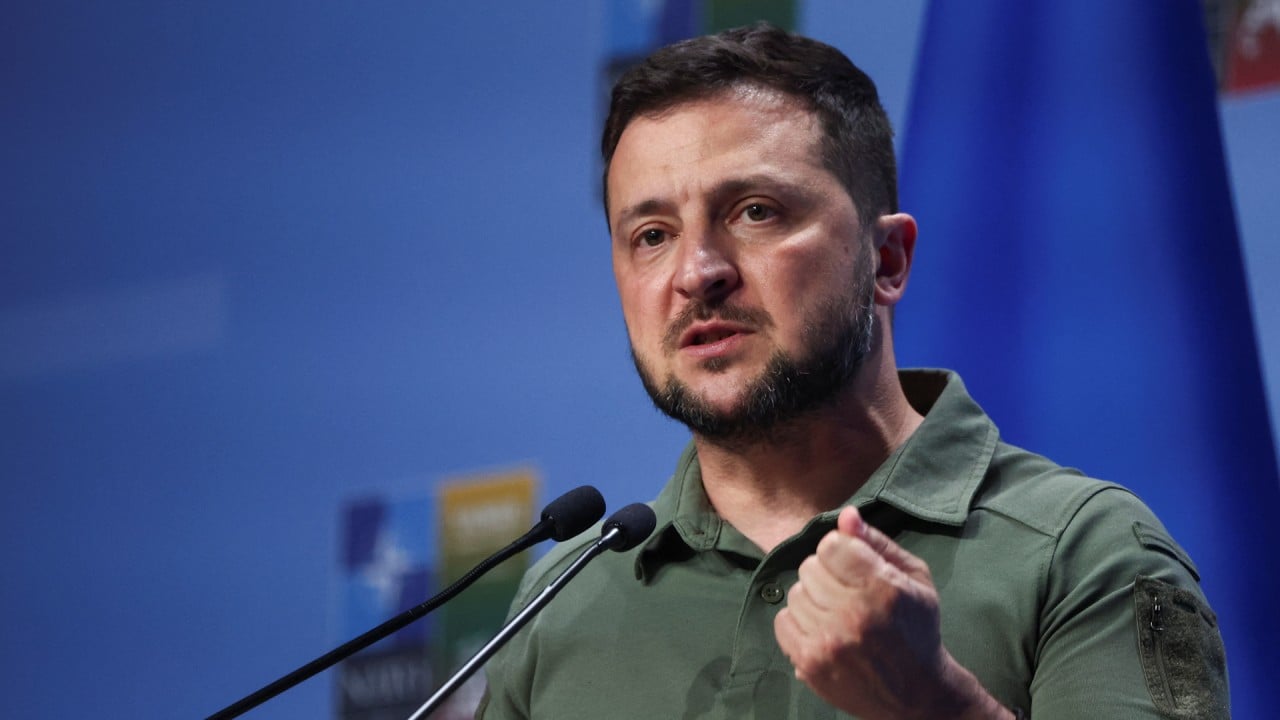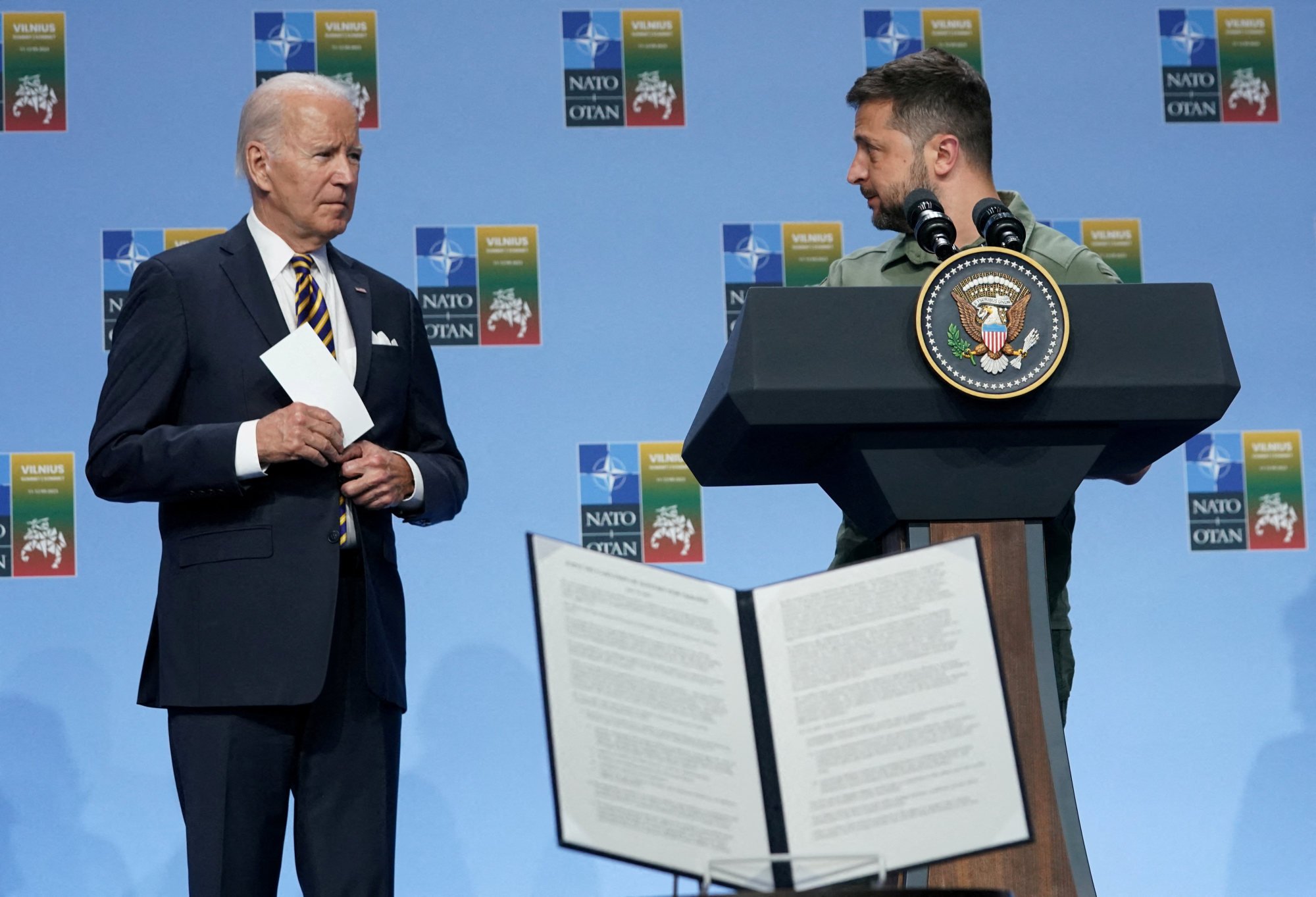
04:28
Ukraine’s leader says Nato summit end a ‘big positive’ despite no timeline for Kyiv membership
Analysis | Nato papers over cracks after Ukraine’s Zelensky loses his cool
- Ukrainian team was angered by a lack of clarity on timeline for joining Nato at summit in Vilnius
- Leaders spent Wednesday cleaning up after President Volodymyr Zelensky’s outburst riled partners
Volodymyr Zelensky was running hot ahead of his sit-down with Nato leaders on Tuesday evening.
That outburst in turn riled the partners who have funnelled billions of dollars of weaponry and aid into Ukraine’s defence against the Russian invasion – the US had been given no warning before Zelensky unleashed his attack on social media.
Over dinner in Vilnius, with US President Joe Biden back at his hotel, the other leaders delivered a clear message to Zelensky, according to one person who was present.
You have to cool down and look at the full package, Zelensky was told. He had, after all, been given a renewed commitment to eventual membership and new security guarantees from the Group of Seven (G7) nations. By the next day, the message appeared to be sinking in.
“Whether we like it or not, people want to see gratitude,” UK Defence Secretary Ben Wallace told reporters the following morning. “You’re persuading countries to give up their stock” of weapons and ammunition, he added.
UK minister says Ukraine should show gratitude for weapons: ‘I’m not Amazon’
This account of the behind-the-scenes wrangling is based on interviews with more than a dozen diplomats and officials involved in the summit who asked not to be named discussing private conversations.
Nato leaders were trying to thread a needle on Ukraine’s membership bid when they arrived in Vilnius: they were seeking language that looked like progress and that Ukraine could sell as progress but fundamentally didn’t leave them any closer to getting dragged into a war with nuclear-armed Russia.
Added to that, they were dealing with a Ukrainian government operating under the intense pressure of the war and whose expectations weren’t always in line with political reality as seen from the alliance.
“I understand the Ukrainians’ frustration,” Estonian Foreign Minister Margus Tsahkna said in an interview.
In the days running up to the summit, diplomats sympathetic to Ukraine had been insisting that Kyiv was making realistic demands on the issue of membership. But the Ukrainian administration’s public comments suggested otherwise.
Foreign Minister Dmytro Kuleba said in an interview with Bloomberg Television on Tuesday that Ukraine has been hoping to receive a formal invitation to join Nato at the summit, even if membership, and the collective defensive commitments that come with it, would only be formalised after the war ends. That was never going to happen, other diplomats said.

“There was a lack of political will,” Kuleba said.
Crucially, it was the US and Germany that insisted on dialling back the commitment to Ukraine joining the alliance. Earlier drafts of the communique offered a clearer pathway to Ukraine eventually joining, but Biden and Chancellor Olaf Scholz were wary of going too far.
Their teams demanded changes in the final days before the summit, upsetting lots of the other European nations, as well as the Ukrainians.
When Biden landed in Vilnius on Monday evening, the language on the membership path was still not nailed down. The next day, the Ukrainian team heard that the text was close to settled and they weren’t going to like it. They decided to send the provocative tweet, in an effort to jolt the debate back in their favour.
Russia’s Medvedev warns Nato aid to Ukraine brings WWIII closer
The post certainly captured the attention of the negotiators, but its effect was counterproductive.
The Americans were particularly irritated. The British intervened in an effort to calm the situation while the Germans also tried to come up with alternatives.
As the situation threatened to come off the rails, Zelensky’s chief of staff, Andriy Yermak, called US National Security Adviser Jake Sullivan, but the text was approved anyway before the Ukrainians arrived.
When Zelensky did get to the summit, he was met by frank criticism from several other leaders, who made it clear that he’d overstepped the mark.

The concern among Kyiv’s more ardent supporters was that the allies were going to repeat the mistake of 2008 when a vague commitment to Ukrainian membership proved a provocation to Russia without offering sufficient protection against military aggression.
“By attaching two conditionalities to Ukraine’s membership that didn’t exist before, Nato is giving the impression of a cold shoulder to Ukraine,” said Kristine Berzina, a geopolitical analyst at the German Marshall Fund in Washington. “It undoes the work Nato agreed the night before, reaching an agreement on Sweden’s bid, and it dampens the other very pro-Ukrainian and very rough Russia language in the summit communique.”
Ambitions of Nato in Asia are simply a delusion of grandeur
Some of those insisting on caution recall the history of European wars and, in particular, the way nations were dragged into long-running conflicts during the early part of the last century.
There’s also the complexity of how the war in Ukraine might end and the possibility that it will leave parts of Ukraine’s territory in dispute and occupied by Russian forces. Some diplomats were concerned that a clear commitment to triggering Nato membership would complicate any eventual negotiations.
But there was also a collective understanding of the need to project unity.
Zelensky “was never alone” at the dinner, Latvian Prime Minister Krisjanis Karins said in another Bloomberg Television interview. “There was no animosity, everybody was speaking a similar language.”

The alliance “will not take in any country during a war, because that would put Nato immediately in a war,” he added.
Zelensky still seemed frosty as he headed into a meeting with Scholz on Wednesday morning, especially by comparison with the UK’s Rishi Sunak – one of Ukraine’s more enthusiastic cheerleaders – and Mark Rutte of the Netherlands, who’s been spearheading efforts to train Ukrainian pilots on F-16 fighter jets to the Ukrainian air force.
By that stage, diplomats on both sides were framing Zelensky’s outburst the previous day as a familiar manoeuvre designed to raise the stakes in a negotiation, a move that has paid off in the past, but this time did not – the Ukrainian president had repeatedly threatened not to show up in the weeks leading up to the summit.
When he spoke to reporters around midday, Zelensky’s tone had shifted.
“We understand some are afraid to talk about our membership in Nato now because they are afraid of the global war,” Zelensky told reporters. Ukraine accepts that it can only join “when it will be safe on our land,” he added.
Then he said he wanted to include “words of gratitude” for the steps taken by allies, peppering his comments with that word “gratitude”.
“We’re going to make sure that you get what you need,” Biden said standing alongside Zelensky later on Wednesday, wearing a tie in the Ukrainian colours. “And I look forward to the day we’re having the meeting to celebrate your official, official membership in Nato.”

